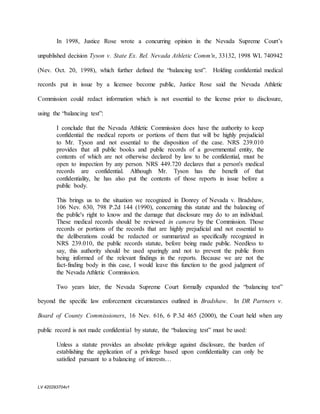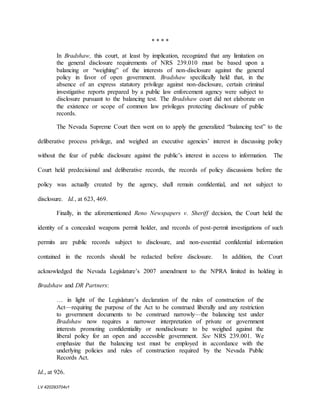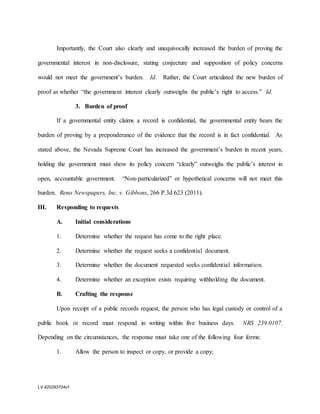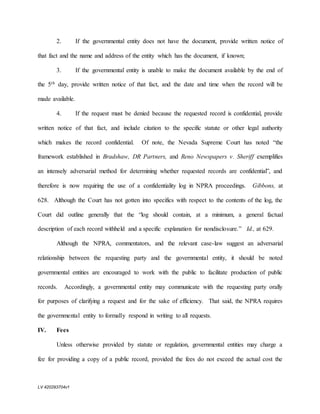The document provides an overview of public records law in Nevada. It discusses that (1) the purpose of Nevada's Public Records Act is to foster democratic principles by providing public access to government records, (2) public records are broadly defined as records in the custody or control of a government entity unless declared confidential by statute, and (3) records can be deemed confidential either by an express statutory exemption or through a balancing test weighing disclosure against interests in nondisclosure.

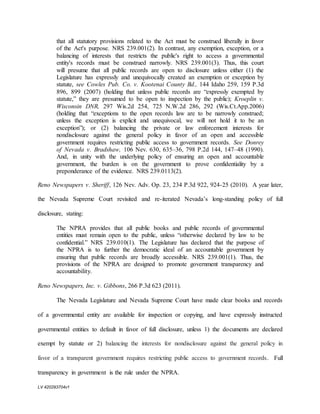
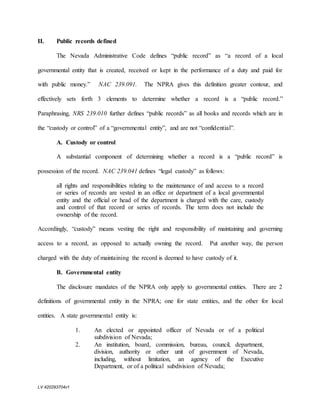
![LV 420293704v1
3. A university foundation; or
4. An educational foundation, to the extent that the foundation is
dedicated to the assistance of public schools.
NRS 239.005(5).
A local governmental entity is: “[a] county, incorporated city, unincorporated town, township,
school district, or any other public district or agency designed to perform local government
functions.” NRS 239.121(3).
C. Confidential
The NPRA separates records deemed confidential into two buckets; records with a
statutory exemption, and records which, after balancing the interests in favor of nondisclosure
against the general policy in favor of a transparent government, are determined to be of a nature
which ought not be disclosed.
1. Confidential by Statute
Many public records have been declared confidential by express statutory provision. In
2008, the Nevada Press Association published a “Nevada Reporter’s Legal Handbook”, which
references a non-exhaustive list of government records which are statutorily exempt from the
dissemination mandates of the NPRA, along with references to the exemption. The list is as
follows:
Juvenile Records: NRS 62H.130, 62H.150
Juvenile Crime: NRS 62H.020
Acknowledgment of Paternity: NRS 126.051
Records of Paternity Actions: NRS 126.211
Adoption Records and Reports: NRS 127.130, 127.140
Grand Jury Proceedings: NRS 172.245, 172.271
Presentence Reports: NRS 176.156
Criminal Records: NRS 179A.090, 179A.100, 179A.110
Reports Of Senior Citizen Abuse: NRS 200.5095
Wiretap Contents: NRS 200.630
Parole Records: NRS 213.1075
D.A/Public Defender Personnel Records: NRS 218.5391
Identity Of Bill Drafter in Legislature: NRS 218.625](https://image.slidesharecdn.com/1692f6b4-d44a-41cf-92e5-c099b3b3ef77-151216183855/85/420293704_v-1_Lorman-Outline-DOCX-4-320.jpg)
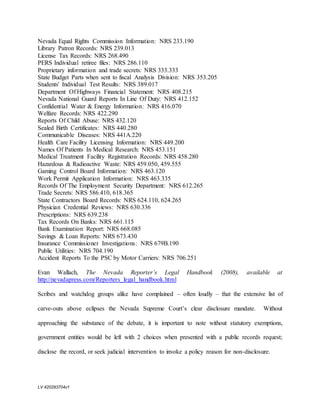
![LV 420293704v1
2. Balancing of Interests Weighs in Favor of Confidentiality.
Although not codified in the NPRA, the second “bucket” of confidential records includes
records which, after balancing the interests in withholding the document against the interests in
open government, are deemed of a variety which should remain confidential. Although
variations existed in several states for some time prior, the “balancing test” was first recognized
by the Nevada Supreme Court in the seminal case of Donrey of Nevada v. Bradshaw, 106 Nev.
630, 798 P.2d 144 (1990). In Bradshaw, the Court examined whether an investigative report
pertaining to a criminal suspect is subject to the same disclosure mandate as criminal history
records under Nevada law. Id. The Court found an investigative report is not specifically
declared to be confidential by Nevada statute. Id., at 634, 147. However, instead of simply
ruling that the report should be disclosed pursuant to the universal mandate of the NPRA, the
Court cautioned, “[w]hile NRS 239.010 mandates unlimited disclosure of all public records,
other courts considering this question have recognized the common law limitations on disclosure
of such records.” Id. Recognizing confidentiality could be “made necessary by considerations
of public policy and on a case-by-case basis”, the Court stated the following public policy
concerns could render a record confidential and justify an agency’s refusal to disclose it:
1. Pending or anticipated criminal proceeding;
2. Confidential sources or investigative techniques to protect;
3. Possibility of denying someone a fair trial; or
4. Potential jeopardy to law enforcement personnel.
Id., at 636, 148. Ultimately, the Court found none of these considerations existed, and issued a
writ of mandamus compelling disclosure of the report. Id.](https://image.slidesharecdn.com/1692f6b4-d44a-41cf-92e5-c099b3b3ef77-151216183855/85/420293704_v-1_Lorman-Outline-DOCX-6-320.jpg)
